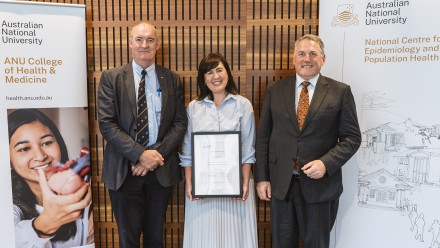Using technology to improve access to mental health care
Share
With 4 out of 10 Australians experiencing mental health problems at some time in their lives, Dr Lou Farrer recognises the importance of making mental health care available to all Australians.
Her work in the space of developing and evaluating accessible digital interventions has earned her the prestigious Tony Ayers Award for translational medicine.
“Digital tools can provide support to people who face barriers to accessing traditional face-to-face care,” says Farrer.
“People can have difficulty accessing psychological support for lots of reasons: the cost of care, stigma, long waiting lists, or lack of availability of psychologists in some areas. Digital interventions bring support directly to people where they are – and can be anonymous and available 24/7.”
While these tools are not designed to replace face-to-face support where it is necessary, they can help fill gaps in the provision of mental health support to the community.
Farrer is particularly focused on addressing these gaps for young adults undertaking tertiary education, where a high prevalence of psychological distress has been identified in recent studies. She leads the Uni Virtual Clinic (UVC-Lite), a digital intervention that targets university student mental health, and provides information and brief strategies tailored specifically for students.
“It’s been important to me throughout my career that the results of my research have direct benefit to the community. The research I’ve conducted with my colleagues has helped to establish the evidence base for digital mental health tools, and this has led to increased use of these tools in health and community services, educational settings, and in the community,” says Farrer.
Farrer’s research evaluating MoodGYM, another digital mental health program in Australia’s Lifeline crisis support service resulted in the adoption of digital programs into Lifeline’s referrals database. This helped to improve access to evidence-based digital mental health support among the over 1 million people who call Lifeline each year.
Following this evaluation Farrer also conducted training with Lifeline staff and volunteers on the use of digital mental health tools. She has also been invited by other mental health services to train their staff on how to use digital tools in clinical practice, and has conducted professional development for psychologists through the Australian Psychological Society.
This translation of evidence into mental health care practice is recognised and celebrated through the Tony Ayers Award.
“We’ve developed new tools and disseminated these in a variety of settings, and my recent research has helped to understand the increased use of digital interventions among mental health service providers, who are the key gatekeepers of mental healthcare,” says Farrer.
“Digital mental health tools have so much potential to improve access to mental health care, and my hope is to see this potential realised through research. I’m delighted and honoured to receive this award that celebrates the work we do to close the research translation gap.”
*The Tony Ayers Award is awarded for Excellence in Research in Translational Medicine at the ANU College of Health and Medicine. The Award is named in honour of long-term John James Foundation Board member the late Tony Ayers AC. The Award takes the form of an Annual Public Lecture focused on the research that has led to the award, and will include an Award Certificate and $15,000 prize. Please see below the recording of the 2023 Tony Ayers Lecture:
By Liz Drummond











